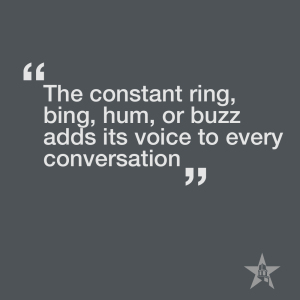Many of you may have watched the Oscar-winning film Her last year and if you didn’t, then you should. The way our world is progressing this film may as well be a true story: a man falls in love with his phone’s operating system.
According to 2013 Apple consumer reports, more than 120 million smartphones were sold in the U.S. alone that year. It is painfully evident that our culture has experienced drastic technological advances particularly in just the last couple decades. The rise of the Internet age and information at the click of a button has been fast progressing. Our millennial generation may be marked as living in what the cultural critic, Alan Kirby, has named the digimodern world: a paradigm shift from the actual to the virtual has taken place. Instead of human interaction, a person now interacts with a screen.
Most likely, the “shock and awe” statistic posited above unfortunately neither shocked nor awed the reader of this article. That is part of the problem. People must realize that the world we live in today is even staggeringly different than it was just a few years ago. My experience in the social world is already vastly different than it was my first year year of college.
Apple released their first smartphone in 2007, yet last year was the first time that I began to see a smartphone each direction I looked. Right now is probably the part where I should stop and confess that I, myself, do own a smartphone and yes, I like you, am glad of the convenience which it provides. However, there is a stark difference between convenience and reliance. Our world is far too reliant on the phone.
Last semester I studied off-campus through the college program, The Oregon Extension (side note- I highly recommend it). During this off-campus experience my peers and I lived in a remote community of students and professors in the mountains of Oregon: an ideal place for reflective thoughts and intentional communal living. During the semester all phones were taken away from Monday morning until Friday night and Internet was seldom available besides on the weekends. For some readers this situation may sound like your worst nightmare, yet for others, such as myself, this may sound like a dream come true: four months without the daily infringement of phone and Internet.
 Now that I am back to normal campus life, culture shock strikes me multiple times a day. Suddenly, it seems that every person has an extra limb- the smartphone. The smartphone is now an added conversation tool at each and every turn. People- whether close friends or new acquaintances- seem incapable of conversation without this intrusive device. Silence is awkward now. Giving someone your full attention is a rarity at best. The constant ring, bing, hum, or buzz adds its voice to every conversation and honestly I have had enough. Notice the it of the last sentence? The phone is not a person and therefore should not be treated as such. I do not condemn the smartphone’s essential usefulness, but I condemn the smartphone as citizen.
Now that I am back to normal campus life, culture shock strikes me multiple times a day. Suddenly, it seems that every person has an extra limb- the smartphone. The smartphone is now an added conversation tool at each and every turn. People- whether close friends or new acquaintances- seem incapable of conversation without this intrusive device. Silence is awkward now. Giving someone your full attention is a rarity at best. The constant ring, bing, hum, or buzz adds its voice to every conversation and honestly I have had enough. Notice the it of the last sentence? The phone is not a person and therefore should not be treated as such. I do not condemn the smartphone’s essential usefulness, but I condemn the smartphone as citizen.
As I transition back to this campus culture engrossed in a digimodern age, I plan to resist a few cultural norms so prevalent in daily life. Unlike many peers, when at a meal my phone will not take precedence over a person. If on occasion I must be in contact with another I will graciously apologize as I interrupt discussion.
I have not been too hard on our culture. I have not been too hard on our millennial generation. Each person, young or old, should be attentive to the ‘really real’ tangible relationships in front of us. Our present day and age posits an absurd paradox: it is easier to communicate with others at a distance, but it is harder to communicate with relationships in proximity. Pay attention to the really real, live an authentic life, and silence the phone.
